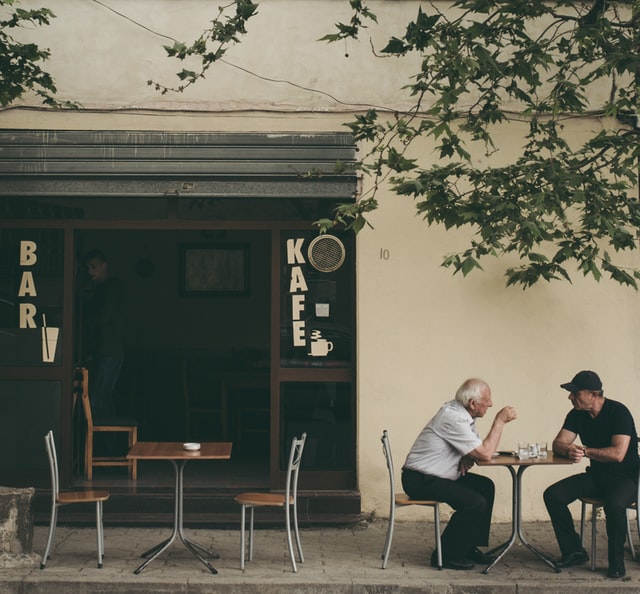Alternative Ways To Say ‘How Are You’ In German Posted by Constanze on Sep 29, 2021 in Language, Vocabulary
Guten Tag! Wie geht es dir? This is the go-to phrase you will learn in any German lesson to ask ‘How are you?’, along with its abbreviation, Wie geht’s? (‘How’s it going?’). You might be wondering if there are some other, more creative ways of saying this phrase, and the answer is, of course, ja!
I know I sometimes get bored of saying ‘How are you?’ in English, because it feels so robotic; sometimes I want to ask questions that will open up better conversations, and sometimes ‘How are you’ just doesn’t feel like the right choice. It can be the same in German – if you’re fed up of asking ‘Wie geht es dir?’, and are looking to expand your vocabulary, try one of these phrases out for size!
Alternative Ways To Say ‘How Are You’ In German
Alles gut bei dir?
Is everything good with you?
“Hallo Karin! Alles gut bei dir? (Hey Karin! Everything good with you?)
Ja danke, alles gut! (Yes thanks, all good!)”
Geht es dir gut?
Are you well?
(Though this looks very similar to ‘Wie geht es dir?’, it’s a bit more specific!)
“Georg! Geht es dir gut? (Georg! Are you well?)
Hallo, Max! Ja, mir geht’s sehr gut, danke! (Hello, Max! Yeah, I’m really well, thank you!)”
Was gibt’s denn Neues?
What’s new?
“Was gibt’s denn Neues, Jana? (What’s new, Jana?)
Nicht viel. Und bei dir so? (Not much. How about you?)”
Wie läuft’s?
How’s it going?
(Läuft comes from the verb laufen, meaning to run/to walk).
“Hallo, Maria. Wie läuft’s? (Hello, Maria. How’s it going?)
Super, danke! (Fantastic, thanks!)”
Na, wie geht’s, wie steht’s?
Literally ‘How’s it going, how’s it standing?’, this is a playful, sing-songy way of asking how someone is doing.
“Na, wie geht’s, wie steht’s? (So, how’s it going?)
Hey, Therese! Gut, danke! (Hey, Therese! Good, thanks!)”
Alles paletti?
Everything good?
(A saying you’re most likely to hear in Berlin. Paletti is an Italian loanword.)
“Und, Larissa? Alles paletti? (So, Larissa? Everything good?)
Alles paletti! (All good!)”
Was geht ab?
What’s up/what’s happening?
“Heyy, Martin. Was geht ab? (Heyy, Martin. What’s happening?)
Nicht viel, Yusuf! (Not much, Yusuf!)”
Was ist los mit dir?
What’s going on with you?
(Often said if someone seems ‘off’)
“Kristoff… Was ist los mit dir? (Kristoff… What’s going on with you?)
Ach… Ich weiß nicht. (Oh… I don’t know.)”
Alles okay?
Everything OK?
“Alles okay, Georg? (Everything OK, Georg?)
Ja, danke. Alles okay. (Yes, thanks. All good.)”
Was macht die Arbeit?
How’s work?
“Hallo, Steffi. Was macht die Arbeit? (Hey, Steffi. How’s work?)
Wie immer, Tamika! (Same as always, Tamika!)”
Wie fühlst du dich heute?
How are you feeling today?
(if you know someone wasn’t feeling great the previous day, for example)
“Hallo, Karl. Wie fühlst du dich heute? (Hello, Karl. How do you feel today?)
Viel besser, Julia. Danke. (Much better, Julia. Thank you.)”
You will see I have included a few examples above, with simple responses to the questions. My next post will focus on giving more creative responses to these questions, so you can express what mood you’re in and what you’re really feeling.
Bis dann! (Until then!)
Constanze
PS. If you liked this post, you might also like this one: Natural German Conversation

Build vocabulary, practice pronunciation, and more with Transparent Language Online. Available anytime, anywhere, on any device.







Comments:
Mark Bauer:
Ich hätte gern die Natural German Conversation post finden. War es kürzlich?